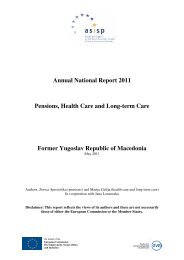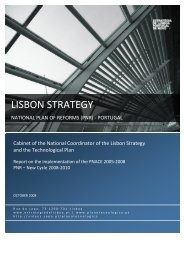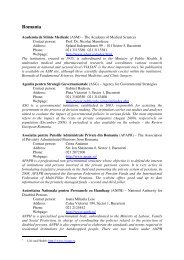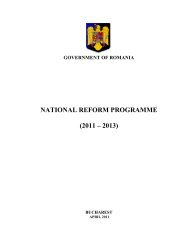National reform programme 2008-2010 Malta - European Commission
National reform programme 2008-2010 Malta - European Commission
National reform programme 2008-2010 Malta - European Commission
Create successful ePaper yourself
Turn your PDF publications into a flip-book with our unique Google optimized e-Paper software.
Education and Training<br />
The Maltese compulsory education system is currently being <strong>reform</strong>ed in order to make it<br />
more flexible to respond to the individual needs of the student who is placed at the centre of<br />
the system. The former Education Division, as a central government department, was<br />
responsible both for the administration and management of State schools and for the<br />
monitoring and the quality assurance of all schools, State and non-State, providing an<br />
educational service from kindergarten through primary and secondary education up to the<br />
compulsory education age of 16.<br />
The Education Act, amended in 2006, provides for two directorates with distinct roles and<br />
functions, though complementary to each other:<br />
1. the Directorate for Quality and Standards in Education which is responsible for quality<br />
assurance of all schools providing an educational service from kindergarten through<br />
primary and secondary education up to the compulsory education age of 16, and<br />
2. the Directorate for Educational Services which provides for the central overall<br />
management of the State education system up to the end of compulsory education.<br />
Curriculum Review<br />
In January <strong>2008</strong>, Government announced the initiation of a consultation process to draw up a<br />
<strong>National</strong> Curriculum Framework for early childhood, primary and secondary education, as<br />
stipulated in the amended Education Act of 2006, to replace the current <strong>National</strong> Minimum<br />
Curriculum. The process, which started in April <strong>2008</strong>, will produce a national curriculum<br />
framework with updated aims and objectives, among other features, for the different<br />
educational phases. This will provide a clear vision for all sectors especially in the College<br />
network recently set up within the state school sector, in making curriculum related decisions.<br />
It is envisaged that this document will be completed in 2009 and will be followed by a public<br />
consultation process. The final document will be then published by <strong>2010</strong>.<br />
Core Competencies Policy and Strategy<br />
In March <strong>2008</strong>, the Maltese Government launched a process to draw up a policy and strategic<br />
plan which addresses the acquisition of core competencies. The focus is on numeric and<br />
digital literacy for all pupils in the primary cycle. This measure ensures the early identification<br />
of pupils who are facing challenges in acquiring these skills and subsequent early intervention<br />
to ensure the acquisition of such competencies by the end of the primary cycle.<br />
The policy and the strategic plan will be available to Colleges in <strong>2008</strong>/2009. This document<br />
will then be refined taking into consideration the feedback received during the first year of<br />
implementation. This measure will ensure that all pupils are literate in these basic<br />
competencies at primary level and therefore have full access to curricular opportunities at<br />
secondary and post-secondary levels.<br />
Review of the Transition from Primary to Secondary Education<br />
At the end of the primary cycle within the State sector pupils sit for a national examination<br />
which determines which type of secondary school they attend (either Junior Lyceum or<br />
Secondary school). Around 60% of pupils make it to the Junior Lyceum which is the more<br />
academic of the two types. Entry into several boys’ Church secondary schools involves a<br />
different selective examination. The recently set-up College system, whereby pupils from a<br />
number of primary schools in the same region feed into one boys’ and one girls’ secondary<br />
school the infrastructure, allows for a more inclusive system. The results of a review that<br />
address selectivity, and the transition process, are being discussed at Ministerial level. A<br />
public consultation process is planned for the third quarter <strong>2008</strong> and decisions will be taken<br />
by the end of <strong>2008</strong>. A number of interim measures are planned for 2009 and <strong>2010</strong>.<br />
<strong>Malta</strong> <strong>National</strong> Reform Programme <strong>2008</strong>-<strong>2010</strong> - 73 -







